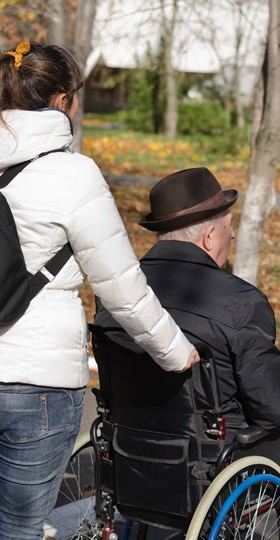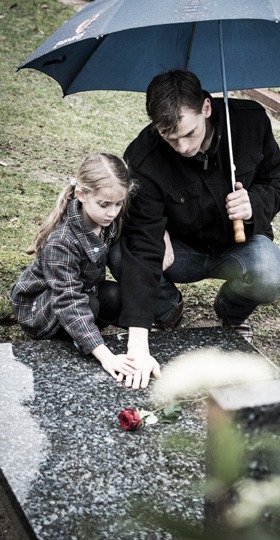Coping with the Death of a Spouse
Looking back on my life, I find it difficult to believe that my partner for life, my lover, my companion and my best friend, is no longer with me to share in my life. It has been a long and painful journey to come to a place of acceptance, and at many points along the way, I did not think that I would ever get here.
Remembering the early days after the death fills me with overwhelming feelings of sadness, loss and longing. If only I had had someone to confide in, who had suffered a similar loss and who could understand my pain, someone who could explain to me what I was going through and what was ahead for me, someone to help me make sense of what did not make sense at all.
It is my hope that my story and my experience of walking through grief will provide you with some level of comfort, understanding and an awareness of the multitude of emotions that you may already be beginning to face in the early days, weeks and months after the death of your spouse.
Your courage in taking the opportunity to read this information is a testament to your ability and internal strength to move forward in your journey through grief.

The Early Stages
When I first learned of my spouse’s death, I was overwhelmed with feelings of shock, disbelief and even denial. I could not understand how this could be – it did not seem real to me, there must have been a mistake. I just could not believe that what had happened was real.
For the first time in your life, you may experience a multitude of feelings and emotions that you have not felt before. You may feel confused, disoriented, disorganized, numb, fearful, and a host of other emotions, which may be more difficult to put into words. You may describe yourself as being on an “emotional roller coaster”. Your emotions may be unpredictable – sometimes you may feel “fine”, and at other times you may only be able to mask the pain and “get through” daily life. At other times, the mere mention of your spouse’s name may cause a surge of intense emotion. The intensity and unpredictable nature of your feelings may not only be frightening for you and your loved ones, but also very painful. At this early stage in your grief, it may seem that little that you do is able to take away the profound feelings of sadness and loss that you feel.
 In time, you will come to learn that these early emotions are natural and healthy, and, in fact, many other bereaved spouses also experience them. You may find comfort in knowing that the emotions that you experience early on, and the emotions that you may continue to feel, are natural responses to the death of a loved one. The emotions of grief are an essential part of the healing process. It took time to accept my emotions and I have since learned how vital it is for me to grieve in a manner in which I feel most comfortable.
In time, you will come to learn that these early emotions are natural and healthy, and, in fact, many other bereaved spouses also experience them. You may find comfort in knowing that the emotions that you experience early on, and the emotions that you may continue to feel, are natural responses to the death of a loved one. The emotions of grief are an essential part of the healing process. It took time to accept my emotions and I have since learned how vital it is for me to grieve in a manner in which I feel most comfortable.
Reaching Out
Reaching out to friends and family was difficult for me. As I had never felt this way before, often I could not describe the pain that I was feeling. I was also afraid that others might judge me and think that I was “not coping”. For many bereaved spouses, it is difficult to reach out for support – many loved ones do not understand what we are going through and oftentimes we want to believe that not talking about our loss will make the pain go away.
In time, you may find it comforting to receive kind words of support and understanding from others who encourage you to openly express the multitude of emotions and grief that you are experiencing. Surround yourself with loved ones who listen without judgment, who are comfortable with your pain and who do not try to “fix you”. Keeping all of your feelings inside may make you feel worse than sharing your pain with a trusted person.
Always remember that you do not have to walk the grief journey alone.
Your Grief is Unique
I have learned through my grief journey that no two people grieve in exactly the same manner. Looking back, this makes sense to me, as our life experiences and relationships with our spouses were also unique and special. As a result of this awareness, I gave myself permission to feel the emotions that came naturally and avoided comparing myself to other people’s experiences or adopting assumptions of how I “should” be grieving.
 Accepting yourself will give you the strength and internal wisdom to adopt a one-day-at-a-time approach to your grief and will also give you the confidence to allow yourself to grieve in the manner that feels right for you. Internal wisdom can be described as our own sense of knowing what is best for us – our inner strength, confidence and belief in ourselves. As a bereaved spouse, you have the right to think, feel and express your grief, and no one, regardless of their “good” intentions, has the right to take that away.
Accepting yourself will give you the strength and internal wisdom to adopt a one-day-at-a-time approach to your grief and will also give you the confidence to allow yourself to grieve in the manner that feels right for you. Internal wisdom can be described as our own sense of knowing what is best for us – our inner strength, confidence and belief in ourselves. As a bereaved spouse, you have the right to think, feel and express your grief, and no one, regardless of their “good” intentions, has the right to take that away.
Be Kind to Yourself
I realize now that in the early stages of my grief, I placed high expectations on myself, as I did not fully realize how my emotions would affect my physical body.
Your feelings of loss and sadness may leave you feeling fatigued and may also interfere with your memory, your ability to concentrate, and your ability to think clearly and make decisions. Many bereaved spouses, not knowing that these feelings are a part of the grief journey, push themselves even harder to compensate for the feelings of devastation and fear that they are experiencing.
Although there is no set answer for how long you will feel this way, what you can do is be kind to yourself – rest when you need to, try to follow a balanced nutritional program, lower your expectations temporarily, rely on the help and support of others, try to accept your limitations at this moment in time, and remove the word “should” from your vocabulary. As you are the expert of your own life and your own grief, do whatever you need to do to cope with your pain in the early stages of your grief. Have confidence that, in time, you will return to the activities of daily living that you participated in before your spouse’s death.
The Benefits of the Funeral Ritual
My spouse’s funeral was a celebration of life and love – it was an opportunity for my loved ones and I to pay tribute to such a special person.
 The funeral ritual not only celebrates the life of your spouse and acknowledges their passing, it may also allow you, your family and the people who knew and loved your spouse, to gather and pay tribute to someone who was very dear and loved by all. The support and care that you receive may gently enable you to move through the initial stages of shock and disbelief into acknowledgment and acceptance.
The funeral ritual not only celebrates the life of your spouse and acknowledges their passing, it may also allow you, your family and the people who knew and loved your spouse, to gather and pay tribute to someone who was very dear and loved by all. The support and care that you receive may gently enable you to move through the initial stages of shock and disbelief into acknowledgment and acceptance.
Moving Forward
In the early stages, I did not feel that there was anything or anyone that could help take away my pain, my feelings of loss, or my devastation. I have since learned that going through the multitude of emotions that all bereaved people experience after the death of a loved one is natural, normal and, in fact, an essential part of the grief journey that moves us forward in our lives.
Denying your grief and hoping that it will go away will only intensify your pain and sadness. Remember that grief is painful, yet necessary, journey – listen to your internal wisdom and be kind, gentle and accepting of yourself. The death of a spouse has a profound impact on your life.
Although you may not recognize this now, in time you will emerge from the devastation. Even though you may not be exactly the same as you were before your spouse’s death, it is possible to experience feelings of joy again and to be able to redefine life in the absence of your loved one.
Making Sense of It All
After the death of my spouse, many concerned family members and friends told me that “time heals”. This statement filled me with anger and resulted in me feeling worse than if they had said nothing at all.
As a newly bereaved spouse, your life will not be the same again. The person who coined the phrase “time heals” could not possibly have lived through the devastation of the death of a spouse. Time will not take away your memories of your life together, or the love that you shared, or the fact that you wish that things could be different. Time will, however, allow you to move through the intense emotional pain of grief, and time will move you forward in your search to find meaning. Time does allow you to redefine the magnitude of your loss and move you forward in your search to make sense of something that, at this moment, does not make sense at all. Understand that the search to find meaning after a devastating loss is a natural and healthy part of the grief journey.

It takes courage, inner strength, the love of family and friends and the special memories of your spouse to journey through grief and into healing.
Have faith in yourself that, in time, you will move through your devastating loss…

